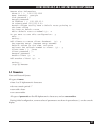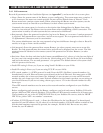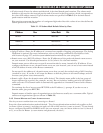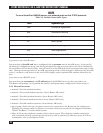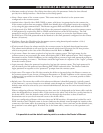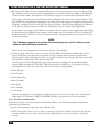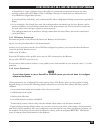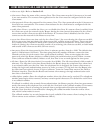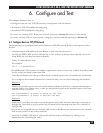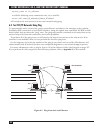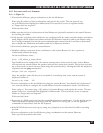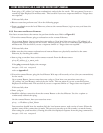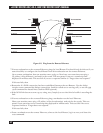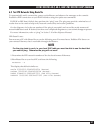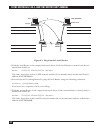
ASYNC ROUTER AR-P, AR-5, AND SYNC ROUTER USER’S MANUAL
55
6. Configure and Test
This chapter illustrates how to:
• Configure hosts on your TCP/IP network to interoperate with the Router
• Test Router TCP/IP installations using ping
• Test Router IPX installations using ping
If you are not running TCP/IP on your network, proceed to Section 6.3 and test your network.
If you are running TCP on your network, configure your hosts and then proceed to Section 6.2.
6.1 Configure Hosts on TCP/IP Network
You might need to reconfigure some of the hosts on a TCP/IP network (LAN) to interoperate with a
Router.
1. Add the name and IP address of your Router to each host that accesses it.
For Sun 4.x/BSD UNIX systems, add this line to the /etclhosts or domain name data file (if you are
using DNS) for each host you want to identify:
Router_lP_address Router_name
For example:
192.1.1.1 salesoffcel
2. For BSD-based UNIX systems, reconfigure applications (that can time out) to allow 30 to 60 seconds
for the worst-case dialup connection time.
Note that the Router can take up to 30 seconds (or much less for sync) to establish the connection.
To reconfigure the sendmail daemon for connection time, use one of the following two methods:
Method 1
Disable the periodic queue rescan from the sendmail daemon, and write a custom mini-daemon to
execute from a root crontab entry to take two back-to-back passes at the sendmail queue each hour.
Add these lines to cron fi1e:
/usr/lib/sendmail -q #once to bring up the link
/usr/lib/sendmail -q #once to deliver the mail
Method 2
Implement a set-UID root script to rescan the queue and invoke sendmail when the connection is
brought up. Several IP service providers use this method for incoming-only lines. The sendmail -R
string works.
3. If you are not using RIP on your network, add a route to the Router for each host on your network
that accesses nodes on the remote network.
On a Sun 4.x/BSD UNIX system, either add a default route to the Router by adding a /etc/
defaultrouter file containing the entry:



